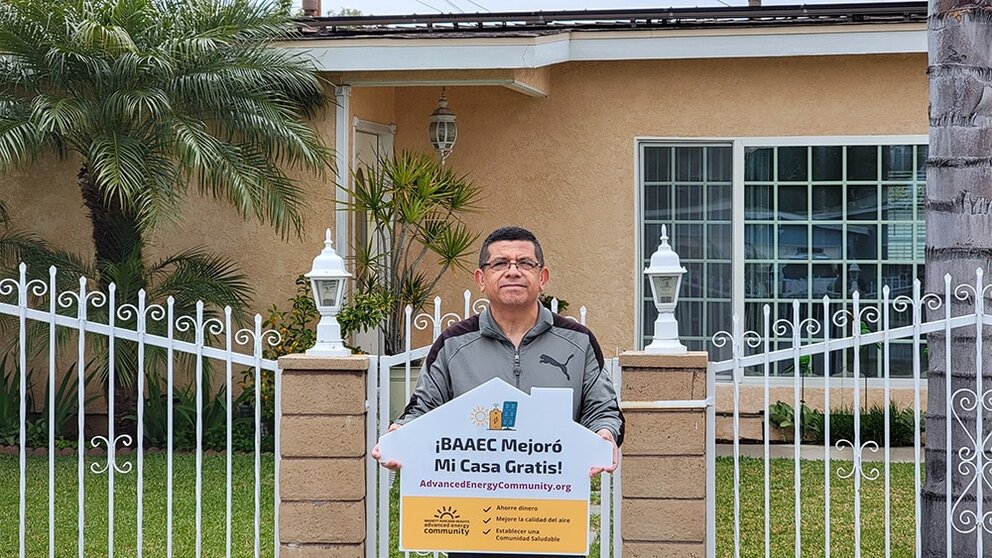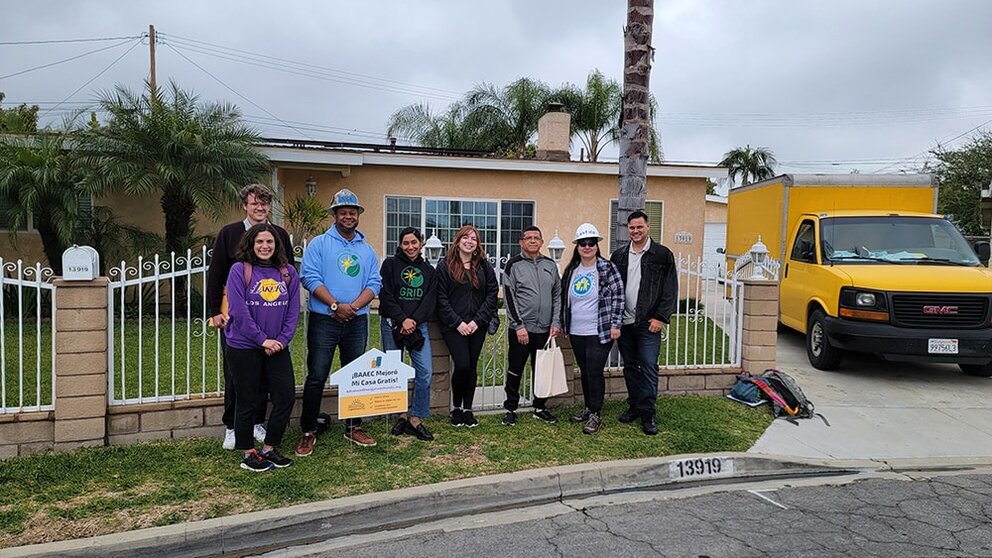Our approach
BAAEC focuses its Advanced Homes program on low-income single family homes in disadvantaged communities and combines all available incentives to keep costs extremely low for participants. BAAEC has taken on the complicated task of administering and coordinating multiple programs and contractors to make BAAEC’s Advanced Homes a reality. The project team is supplementing CEC grant funding with additional support from:
- TECH Clean California which provided a grant for no-cost water heater tune-ups and replacements for BAAEC’s Advanced Homes participants.
- The Los Angeles Cleantech Incubator (LACI) is offering up to 20 no-cost induction stoves to residents to further electrify their homes, funded by the State of California.
- California Public Utilities Commission’s (CPUC) Self-Generation Incentive Program (SGIP) that provides the battery storage systems to residents at no-cost.
- Energy Savings Assistance through Quality Conservation Services, which offers free home assessments to evaluate eligiblity for receive free induction stoves and energy efficiency and weatherization upgrades.
BAAEC’s Community Solar feature, which makes clean energy accessible for renters, is one of the first Community Solar Green Tariff (CSGT) projects in California. The BAAEC community solar project is offered in partnership with the Clean Power Alliance (CPA), and will offer 100% clean electricity at a 20% discount to everyone enrolled.
BAAEC’s outreach approach, both for Advanced Homes and Community Solar, has been to build trust in the community by working with local community-based organizations Active SGV and Day One. We developed a robust stakeholder engagement and partners strategy to ensure local involvement and support project outreach. For example, we created the BAAEC Community Advisory Committee and a BAAEC Technical Advisory Committee, and we have coordinated with the LA County Sustainability Office, the Office of LA County Supervisor Hilda Solis, and Bassett Unified School District.
BAAEC’s overall approach — at its very core — is one of complete case management and wrap-around services. We stay engaged with participants throughout every step of the upgrade process and serve as a one-stop point of service with referrals for other income-qualified services and programs.
What are a few things you wish you had known to ask about earlier in your project?
Through our work on Advanced Homes, we quickly realized that it would be beneficial to build in mechanisms to fund basic home repairs that are often barriers to homeowners participation. Programs built around supporting low-income residents, like BAAEC’s Advanced Homes, are likely going to need to include repairs such as roof replacements, panel upgrades, or building permitting compliance issues.
We also realized that it is challenging to work in unincorporated areas of LA County. Unincorporated areas tend to have less of a local community identity as they are part of a very large supervisorial district for purposes of political representation. Finally, unincorporated areas are less like to have an established and readily identifiable common hub for focusing community engagement and participation efforts.
What is something that surprised you about the upgrade process so far?
We know that building community trust is crucial for program success, but we were surprised at just how skeptical folks are of any programs offering free services. With the many other concerns and demands that occupy time and attention, we found that energy and utility bills are not a top priority for many community members. Building project recognition and community trust simply takes a lot more time and resources than expected. Lastly, the need for upfront financing for projects supported by SGIP is a major program challenge when it comes to offering no-cost battery storage for these homes.
What are three things that you learned during the first project that you will surely use in the remaining projects?
We learned very quickly that there is a huge need for standardizating qualification across various energy programs in order to best support communities on the pathway to electrification. To scale up advanced energy communities across California, we need to streamline, synchronize, and coordinate upgrades, starting with the many different eligibility requirements across energy programs.
Also, aesthetics matter! Homeowners, regardless of income level, want their energy upgrade equipment to match their design choices. Setting expectations from the start is crucial and goes a long way to encouraging participants to become true champions of the project. Finally, planning for delays with permits and other externalities is a must!
What is one piece of advice you have for any homeowner looking to take on a multi-part electrification project?
Patience and persistence are key as there are many moving parts which require time and coordination. For homeowners looking to take on a multi-part electrification project, find local neighbors who have gone through the process to learn from their experience and set expectations. Be sure to rely on community organizations, local non-profits, and other resources that support residents on their journey toward healthier homes!
To learn more about BAAEC visit advancedenergycommunity.org, follow on social @hellobaaec or contact at hello@advancedenergycommunity.org.
To learn more about The Energy Coalition visit energycoalition.org, follow on social @theenergycoalition and @_TECTweets or contact at info@energycoalition.org.

Lessons Learned
Local BAAEC project teaches us what to look for when upgrading a home
Background:
Tell us a little about this project: who you are, why you are upgrading homes, and what your approach has been (laying incentives and helping folks through the process)
Who we are
We are the Bassett Avocado Heights Advanced Energy Community (or BAAEC, pronounced “bay-sea”, for short). BAAEC is led by a team of local nonprofits, community organizations, and energy technology leaders looking to bring together the community to produce local renewable energy, lower energy bills, and reduce local pollution. Increasing the community’s ability to produce local renewable energy will mean less reliance on fossil fuels, less pollution, and more resiliency in the event of power outages. The project is funded by a grant to The Energy Coalition (TEC) from the California Energy Commission’s (CEC) Electric Program Investment Charge (EPIC) program.
One of BAAEC’s features is the Advanced Homes program, which offers helpful free energy technologies and services to eligible homeowners. Eligibility is open to income-qualified single-family homeowners in the Bassett and Avocado Heights neighborhoods and surrounding areas in unincorporated Los Angeles County.
These services are designed to help residents save energy and money, be more energy resilient, improve local air quality, and modernize their homes. Eligible residents may receive:
- Solar panels and battery storage to generate electricity and store backup power during an outage.
- Induction stove, provided by the Los Angeles Cleantech Incubator (LACI), to provide a faster, safer, healthier cooking solution.
- Water heater tune-up service to help avoid a future emergency replacement and determine whether a water heater replacement is needed. Eligible homes can receive a free water heater!
- Free energy home assessments to see if the home is eligible for free upgrades, such as smart thermostats, attic insulation, LED lights, water efficient aerators, furnace replacement, and more.
The Energy Coalition believes in a future where communities are energy-producing networks and clean energy is affordable and accessible for everyone. Today, there are many barriers to achieving this vision — local governments are resource constrained, planning and permitting community-scale projects can be complex, and there is nostandardization to the process. BAAEC’s Advanced Homes program aims to break down the barriers and the complexity of planning and permitting community-scale energy projects to standardize the process and ensure that disadvantaged communities are an integral part in the transformation of our clean energy future.
Why we are upgrading homes
We know that change starts at home. To move toward electrification we need to give people the resources needed to make change at home, with a focus on communities that need the most support and resources. Helping communities obtain local renewable energy will lower folks’ energy bills, reduce their energy burden, and provide reliability and resiliency. Through home upgrades and electrification measures, we are upgrading homes, improving residents’ comfort and safety, and ensuring these folks can participate in the transition to our clean energy future.
When upgrading homes for low-income and environmental justice communities, we start to address equity and the historical lack of investment in these communities. Upgrading homes with electrification measures makes it easier for families to transition to electric vehicles (EVs) and continue on the path toward electrification. Overall, the connection to clean, safe, and affordable energy at home can be a catalyst to a healthier environment.

Bassett Avocado Heights Advanced Energy Community (BAAEC), is helping 50 homeowners through every step of the upgrade process to electrify their homes. BAAEC is led by a team of local nonprofits, community organizations, and energy technology leaders. Through their Advanced Homes program, BAAEC offers eligible income-qualified residents in the Bassett and Avocado Heights neighborhoods and surrounding areas in unincorporated Los Angeles County the following upgrades:
- Solar panels and battery storage
- Induction stove
- Water heaters
- Free energy home assessments to see if the home is eligible for free upgrades, such as smart thermostats, attic insulation, LED lights, water efficient aerators, furnace replacement, and more
The Advanced Homes program combines all available incentives to offer eligible homeowners up to $50,000 in free energy technologies. Additionally, BAAEC has taken on the complicated task of administering and coordinating multiple programs and contractors to make a participant’s home electrification upgrade a reality.
Here’s their advice when considering a multi-step home electrification upgrade:
- Inquire if electrification programs have ways to fund basic home repairs such as roof replacements, panel upgrades, or building permitting compliance issues
- Aesthetics are important, ask about matching energy upgrade equipment to your design choices
- Plan for delays with permits and other externalities
- Patience and persistence are key as there are many moving parts which require time and coordination
- Find local neighbors who have gone through the process to learn from their experience and set expectations
Through home upgrades and electrification measures, resident’s can improve comfort and safety and save on energy bills. BAAEC is making a connection to clean, safe, and affordable energy to a healthier environment, one home electrification upgrade at a time. In one of our future newsletter editions, the Switch is On is excited to showcase a BAAEC Advanced Home when their first home upgrade is completed. To learn more about BAAEC visit advancedenergycommunity.org.
